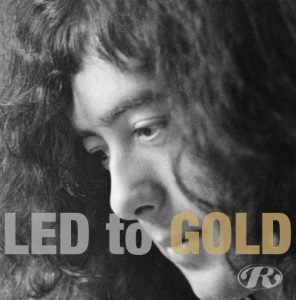27 Sep Jimmy Page Reviews New LZ Album

Soon, Led Zeppelin’s guitar star, Jimmy Page, exclusively gives his candid and decidedly controversial views on Elton John, Grand Funk Railroad, Black Sabbath, a recent Milan police riot and rock concert, pop critics, James Taylor, frustrated musicians, Eric Clapton, head changes through superstardom, George Harrison, Paul McCartney, Rolling Stone magazine, Gustav Mahler, the old Sun label stuff, Melody Maker, Pierre Trudeau, and much more. This world exclusive interview with the top band in the music business will continue in our next issue. And you won’t find it anywhere else.
RY: Jimmy, let’s firstly discuss the fourth Led Zeppelin album? Will it be called Led Zeppelin 4?
JP: No.
RY: I had an idea you might get off that bandwagon. What will it be called?
JP: It’s not going to be called anything.
RY: Really.
JP: It’s a non-entity in the marketplace. It’s not going to have a title. There’s four rooms or symbols on it, and each of us has picked out one. They’ll be on the inside of the dust jacket. There’s no writing at all on the outside cover. Apart from the building with one of the posters for the OXFAM thing, which says that everyday somebody receives relief from hunger you know, the one I mean, where someone is lying dead on a stretcher. Unfortunately the negatives were a bit of a blur… you can just about make it out if you’ve seen the poster before. It’s like a puzzle. But there’s no writing on the jacket at all.
RY: How about running down some of the tracks on the album?
JP: Track order. Well, firstly, there’s Black Dock which we played tonight and have been doing at some of the gigs. It’s a bit of hairage… a bit of a hairy one which John Paul Jones worked out the impossible part of the riff. It’s quite a hairy one really, compared to some of the other things on the album.
And then there’s one called Rock and Roll which we occasionally do on stage. It’s just what it says. Just a rock ‘n’ roll thing. It’s really quite good.
Then there’s Battle of Ever More with Sandy Dennis (of the Fairport Convention) singing. It’s just Robert and myself. I play mandolin, and Sandy sings with Robert. That’s a quiet one.
Next comes Stairway to Heaven, a rocker which we did tonight. It’s nice.
RY: Who wrote Stairway to Heaven?
JP: Well, everyone put in a bit really. Robert wrote the words, which is the key to it. Everything we do is really a mass co-operation I suppose. Everyone gets a say in everything. That’s how it usually is anyway. That’s what the group’s about really.
Side two opens with Misty Mountain Hop, which we’ve never played in the States or Canada. We have done it in some European concerts though.
Four Sticks is a thing which John Bonham plays with four drum sticks literally . . . two in each hand tearing along like mad. John Paul Jones put in some Moog synthesizer in a small section as well.
Then there’s going to California, which we did tonight. It’s an acoustic thing.
The side finished with When the Levy Breaks. It’s an old Memphis Minnie and Kansas John McCoy song… I first hear it done by Memphis Minnie on an album.
It’s sort of changed a bit now. Robert sings the same words as Memphis Minnie, but the whole arrangement is completely different. But Robert sings it in Memphis Minnie fashion so she’s getting a credit as well.
You’ll probably feel familiar with the other things. You’ve heard three of the tracks? What do you think? Do you think it’s a new departure or is it what you expected it to be?
RY: I think it’s great. There was a bit of each. There’s a little of what you expected, and then you’d hear something else and say, Hey that’s new and nice. I really got off on the tracks.
But how do you personally feel about this new album, as compared with your three earlier LP’s?
JP: Personally I lived with it for so long now – and seen so many mess ups by other people in the process of getting it together – that my senses have been battered into a pulp. I can’t even hear it anymore. It’s become like that. I don’t mean I can’t put it on and listen to it. I mean, I can’t get anything out of it at all. It’s really a dreadful state to be in.
But the fact is that there were so many foul ups by engineers… basically engineers. Andy Johns deserves to be hung, drawn and quartered, for the fiascos he’s played. Which is a shame because everyone was dead keen. But it just sort of dragged on and on because of mess ups that he made.
For instance, there was a statement that he made that ‘I know the place where we should mix this’ and we went there and wasted a lot of time. I won’t tell you the place because it’s no fault of the studio. He convinced us all that this was the place… the best place in the world… the best room… which is all we’re going for… the room I mean. With the right room you can hear the tape true to form and the record will sound exactly the same as that room.
And of course, it didn’t. And we wasted a whole week wanking around. It’s totally unforgiveable. From that point onwards, he crapped himself and he disappeared. We had to find a new engineer to tie it all up. That’s when the fiasco started because I was pretty confident after that week that it sounded alright to me. In that room, it had sounded great anyway. The trouble was that the speakers were lying. It wasn’t the balance – it was the actual sound that was on the tape. When we played it back in England it sounded like it had gone through this odd process. I don’t know, all I can put it down as, is the fact that the speakers and the monitoring system in the room were just very bright, and they lied.
RY: How long ago did you start working on the album?
JP: Some of the tracks were started in December. That was at the Island Studios in London. I can’t remember it all. We’ve got such a backlog of stuff on tape now, that even when we release the new album, we’ll still have a lot in the can.
Anyway, after Island we went to our house in Hampshire, a place where we have often rehearsed, and we decided to take the mobile studio truck there because we were used to the place… we’d often rehearsed there, we lived there sometimes, and we just set the gear up. We took along the Rolling Stones’ mobile truck. Then as we thought of an idea, we got it down on tape right away, and a lot of tracks came out of that. Almost everything on the album.
In a way, it was a good method of doing it. The only thing wrong was that we got so excited about an idea, and we’d rush to finish its format and get it on the tape – it was like a quick productivity thing. We got so excited about having all the facilities there.
What we needed was about two weeks solid with the mobile truck. We only actually had about six days, but we should have made it two weeks. We needed one full week to get everything out of our system and getting used to the facilities and then really getting together in the second week. That’s probably what we’ll do in the future, now we know the facilities we have available. John Paul Jones is getting a studio put in his house, and so am I. It seems to be the answer really.
You need the sort of facilities where you can have a cuppa tea and wander around the garden and then come in and do whatever you have to do, instead of walking into a studio… down a flight of steps into a fluorescent lights and opening up a big door that’s soundproof and there’s acoustic tiles everywhere.
With ordinary studios, it’s like programming yourself, as you walk down those stairs, that you’re going to play the solo of your life, which you very rarely do. It’s the age old problem that recording studios are the worst place to record. It’s the hospital attitude that studios have.
RY: Keith Richard was saying recently that he thinks the Stones’ mobile truck has shown that conventional studios are obsolete. After all, the environment is so important and studios are usually so cold and impersonal.
JP: That’s the whole thing. I personally get terrible studio nerves. Even if I’ve worked the whole thing out at home beforehand, I get terribly nervous playing anyway. But when I’ve worked something out at home which is a little above my normal capabilities, when it comes to playing it at the studio, well – to use of our favorite expressions – my bottle goes. If it’s something that you can just knock off fairly easily, then fair enough. But when it gets a little more difficult – well. That’s one reason why I’m personally getting my own studio set up together at home.
It’s not going to be as expensive as I though it would be, and obviously everyone’s going to benefit from it. I’ll be able to go all the acoustic things at home – I’m mainly going to use the studio for acoustic things. Then I’ll just hand it over and say here it is. I’ve managed to pull it off. I suppose it’s the same thing with you, John?
John Paul Jones: Exactly.
JP: It’s just the studio nerves… having the home new environment….
The Nerves were instilled into you in the session days and you never lose them, soon as that red light goes on. It could be three years ago making all those dreadful records.
RY: How do you feel about the new album, John?
JPJ: I quite like them all actually, you know; any album by Led Zeppelin is alright by me really. Oh, it’s rocking on merrily. And here’s one more.
To be continued Soon….


